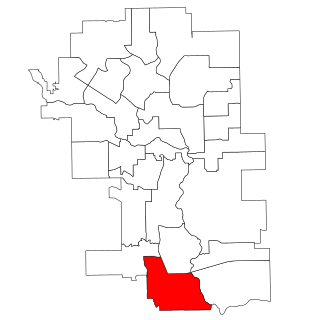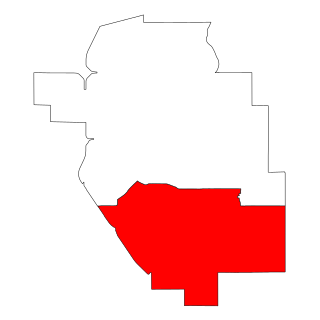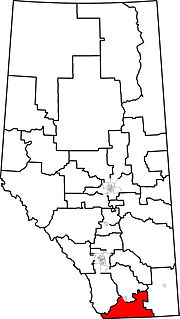This article does not cite any sources .(December 2009) (Learn how and when to remove this template message) |
The 2nd Alberta Senate nominee election was held in Alberta, Canada, on October 19, 1998, in conjunction with the Alberta Municipal Elections. It was held to elect Alberta's candidates for appointment to the Senate of Canada.

Alberta is a western province of Canada. With an estimated population of 4,067,175 as of 2016 census, it is Canada's fourth most populous province and the most populous of Canada's three prairie provinces. Its area is about 660,000 square kilometres (250,000 sq mi). Alberta and its neighbour Saskatchewan were districts of the Northwest Territories until they were established as provinces on September 1, 1905. The premier has been Rachel Notley since May 2015.

The Senate of Canada is the upper house of the Parliament of Canada, along with the House of Commons and the Monarch. The Senate is modelled after the British House of Lords and consists of 105 members appointed by the Governor General on the advice of the Prime Minister. Seats are assigned on a regional basis: four regions—defined as Ontario, Quebec, the Maritime provinces, and the Western provinces—each receive 24 seats, with the remaining portions of the country—Newfoundland and Labrador receiving 6 seats and the three northern territories each assigned the remaining one seat. Senators may serve until they reach the age of 75.
In the first senate election held in 1989, Prime Minister Brian Mulroney had promised to advise the Governor General to appoint the winner of the election. In 1998, Prime Minister Jean Chrétien advised Governor General Adrienne Clarkson to appoint two senators for Alberta shortly before the vote.

The Prime Minister of Canada is the primary minister of the Crown, chairman of the Cabinet, and Canada's head of government. The current, and 23rd, Prime Minister of Canada is the Liberal Party's Justin Trudeau, following the 2015 Canadian federal election. Canadian prime ministers are styled as The Right Honourable, a privilege maintained for life.

Martin Brian Mulroney is a Canadian politician who served as the 18th prime minister of Canada from September 17, 1984, to June 25, 1993. His tenure as prime minister was marked by the introduction of major economic reforms, such as the Canada-U.S. Free Trade Agreement and the Goods and Services Tax, and the rejection of constitutional reforms such as the Meech Lake Accord and the Charlottetown Accord. Prior to his political career, he was a prominent lawyer and businessman in Montreal.

The Governor General of Canada is the federal viceregal representative of the Canadian monarch, currently Queen Elizabeth II. The person of the sovereign is shared equally both with the 15 other Commonwealth realms and the 10 provinces of Canada, but resides predominantly in her oldest and most populous realm, the United Kingdom. The Queen, on the advice of her Canadian prime minister, appoints a governor general to carry out most of her constitutional and ceremonial duties. The commission is for an unfixed period of time—known as serving at Her Majesty's pleasure—though five years is the normal convention. Beginning in 1959, it has also been traditional to rotate between anglophone and francophone incumbents—although many recent governors general have been bilingual. Once in office, the governor general maintains direct contact with the Queen, wherever she may be at the time.
Despite these appointments, two senator nominees were selected in a block vote, that was broken down along municipal electoral districts instead of provincial electoral districts. It was conducted by Elections Alberta, and candidates were registered with provincial parties.
Elections Alberta is an independent, non-partisan office of the Legislative Assembly of Alberta responsible for administering provincial elections, by-elections, referenda within the Province. This is in accordance with the Alberta Election Act. Elections Alberta also oversees political parties and candidates in accordance with the Election Finances and Contributions Disclosure Act.
Bert Brown and Ted Morton, both nominated by the Reform Party, won the election, but were not appointed to the Senate before their terms expired. No other provincial political party nominated candidates.
Bert Brown was a Canadian senator and retired farmer and development consultant who resided in Balzac, Alberta.

Frederick Lee Morton, known commonly as Ted Morton, is a Canadian politician and former cabinet minister in the Alberta government. As a member of the Legislative Assembly of Alberta, he represented the constituency of Foothills-Rocky View as a Progressive Conservative from 2004 to 2012. He did not win reelection in the 2012 Alberta general election. Morton was a candidate for the leadership of the Progressive Conservative Association in its 2006 and 2011 leadership elections. Dr. Morton is currently an Executive-in-Residence at the School of Public Policy at the University of Calgary and Senior Fellow, Energy and Environment, at the Manning Foundation. He also serves on the Board of the Alberta Land Institute and the Board of Governors of the Council of Canadian Academies.











